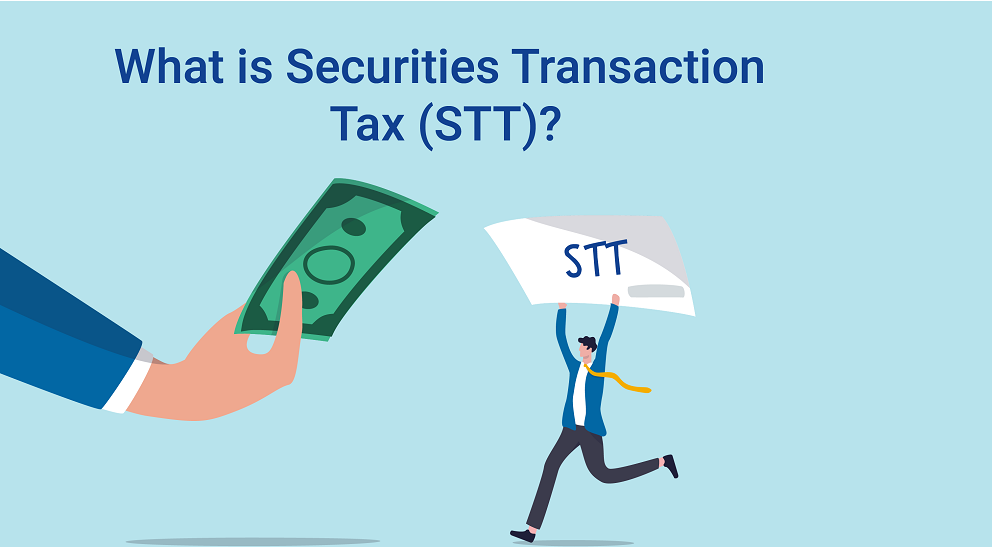Those of you who invest in the share market or mutual funds must have seen different types of taxes in the charges section of the brokerage slip. These taxes also include STT which makes a big contribution in increasing your transaction cost to a great extent. This tax is levied on transactions of securities which are listed on the stock exchange. If you also invest in any kind of asset related to the stock market, then it is important for you to know about STT. In today’s article, we will try to know about this tax in detail.

What is STT?
STT means: Security Transaction Tax.
STT is a direct tax levied by the Government of India on transactions of securities that are listed on the stock exchange. These securities may include equity, derivatives, equity oriented mutual funds and IPO etc.
STT was first implemented under the Financial Act of 2004 to prevent tax evasion in financial transactions and make the system transparent. Before STT, a lot of illegal tax related work was done due to people not declaring capital gains or profits from equity selling.
STT is charged on the value of the transaction and under the STT Act, it has been specified in which cases it will be applicable and also by whom it has to be paid, buyer or seller. For example, if you buy some stock through your broker for intraday or investing, then you have to pay STT along with its brokerage and other charges which further increases the value of your purchase.
How does STT work?
As already mentioned, STT is levied on transactions in securities such as stocks, mutual funds and derivatives etc. which was implemented in 2004 to replace the earlier tax system stamp duty. Both buyer and seller may have to pay STT depending on the security being transacted and its rate also varies.
STT is deducted by the stock exchange on behalf of the investor and later deposited to the government. The main objective of STT is to prevent evasion of capital gains tax and to collect revenue for the government. This also reduces the number of people trading in the market as it also increases the cost of trading. STT also reduces speculative trading in the market and also impacts liquidity.
Where is STT applicable ?
Whenever a security is traded on an Indian stock exchange, a security transaction tax is levied on it. This tax can be applicable on both buyer and seller, which is collected by the stock exchange and deposited to the government. These securities include:
- equity share
- Equity Oriented Mutual Fund
- derivatives
- ETF
- Unlisted shares included in IPO
The rate of STT may be different for each security which is determined by the government.
How is STT calculated?
STT is applicable on the value of the security being transacted, even if the trader makes a loss or profit. Let us understand this with the help of an example.
Aamir is an active trader who bought 500 shares at Rs 100 each on intraday basis and sold them at Rs 105. STT at the rate of 0.025% is applicable in intraday equity trades. To calculate STT in trade as follows:
STT: 0.025*105*500 = 13.125
The STT rate is determined by the government and is changed from time to time. You can see the STT rate applicable for different securities below.
STT rates
| Securities Transaction |
STT rate | STT responsibility |
| Purchase of Equity Shares (Delivery Based) | 0.1% | Buyer |
| Selling of equity shares (delivery based) | 0.1% | Seller |
| Buying Equity Oriented Mutual Funds | NIL | |
| Selling of Equity Oriented Mutual Funds | 0.001% | Seller |
| On selling of options (derivatives) | 0.017% | Seller |
| Option selling where the option is exercised | 0.125% | Buyer |
| On sale of futures contracts (derivatives) | 0.01% | Seller |
| ETF Selling | 0.001% | Seller |
| Sale of unlisted shares in OFS and IPO where shares are to be listed on the stock exchange. | 0.2% | Seller |
Effects of STT
Increase in charges: For those who trade in the stock market, transaction costs increase due to STT. Due to this their profit margin also reduces.
Reduction in Liquidity: STT may result in reduction of liquidity in stock trading. Due to high STT in some securities, people avoid trading and investing in them. This affects the volume and liquidity in the stock market.
Change in trading strategy: Due to STT, people avoid trading in those securities which are likely to attract higher tax. Therefore, they may have to change their trading strategy and shift to some other security.
Conclusion
STT is a direct tax that is collected by the stock exchange from investors and traders on the value of the security traded. It was first implemented in 2004 whose main objective is to prevent evasion of capital gains tax. This is a major source of revenue for the government but it can become a problem for investors as it reduces their profit margins and increases trading costs.

